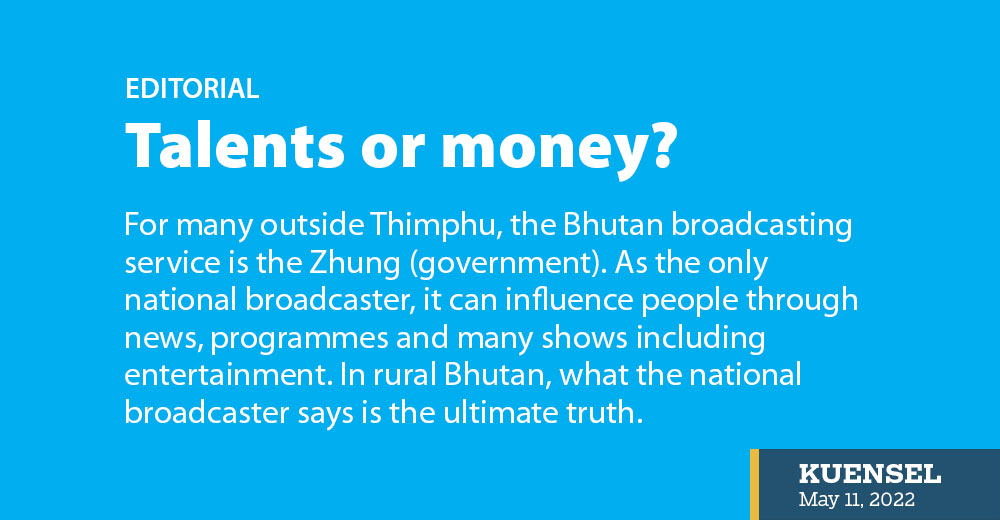For many outside Thimphu, the Bhutan broadcasting service is the Zhung (government). As the only national broadcaster, it can influence people through news, programmes and many shows including entertainment. In rural Bhutan, what the national broadcaster says is the ultimate truth.
In recent years, BBSC is not only broadcasting news or public announcements. It is also providing a platform for entertainment. In our context, it is the most popular channel amongst those who can only understand Dzongkha. Local content is in short supply.
Surprisingly, the only TV can be manipulated for commercial interest. The popular reality shows- singing competitions is a good example. The details are not known, but some smart entrepreneurs have benefited from the platform. In the entertainment business, reality shows have become a lucrative source of income. But Bhutan, as we all are ready to claim, is different.
A few individuals benefiting from their ingenuity is acceptable. But if it is exploiting or making the most in the name of promoting culture, we should pause and think. The national television’s intervention in allowing only SMS votes from the public to decide the winner and not allowing bulk voting is a good decision. Reality shows, even if it is a copy from the regions, is popular among the populace.
Entertainment is a good business. But it should not be in the name of promoting culture or exploiting artists. The average Bhutanese enjoying the Zhungdra or rigsar song dotted with dry humour may appeal to the public, but not many do not know what is happening behind the scene. If contestants are asked to garner votes or income for the organisers, the very purpose of a reality show is defeated. Such shows are intended to recognize skills, promote culture, even if secondary, and entertain people.
A contestant visiting offices begging for votes or money doesn’t happen in many countries. There are talks that the so-called artists are exploited for wants or votes, money in other words.
Reality shows around the world identify talents in people besides making money. Popular shows like American Got talents, Britain Got talents or Indian Idol launches ordinary people with talents to greater heights, based on skills even if it is commercialised. If the logic is the same, many will appreciate the logic beyond the individual talent. But there is a gray area. Our talent shows cannot be separated from commercial interest. Therefore, we see contestants going around asking for votes or money. Money cannot buy talents, but when this is not specified, those who can garner the most support (through votes) can be a winner.
For the craze for money or profits, we are insulting talents. An artist may be good for his/her talents, but the craze for profits could make that secondary. Why should talented people go around asking for votes or money? The arrangements between the Telocs and organisers indirectly promotes commercialism, not skills or talents.
The BBSC can make millions in profit if they join the bandwagon of commercialising art. The recent decision it made will not bring revenue. Reality show organisers would think twice after the BBSC announced the decision. But money is not all that matters.


